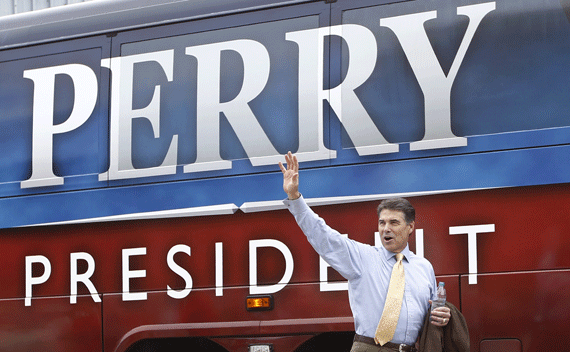A Foreign Policy Platform from Rick Perry? Not Quite
More on:

Rick Perry used his speech yesterday to the Veterans of Foreign Wars 112th National Convention to sketch his foreign policy views. Here is the essence of what he had to say:
As the tenth anniversary of the attacks of 9-11 approaches, we must renew our commitment to taking the fight to the enemy, wherever they are, before they strike at home.I do not believe America should fall subject to a foreign policy of military adventurism.
We should only risk shedding American blood and spending American treasure when our vital interests are threatened.
And we should always look to build coalitions among the nations to protect the mutual interests of freedom-loving people.
It is not in our interests to go it alone. We respect our allies, and must always seek to engage them in military missions.
At the same time, we must be willing to act when it is time to act.
We cannot concede the moral authority of our nation to multilateral debating societies.
And when our interests are threatened, American soldiers should be led by American commanders.
I say this because we owe to them, and to their loved ones, to make sure any war we wage is led by the country with the most advanced military technology and the best training.
Three things to note about the speech. First, it’s politically savvy. There is something in it for every significant foreign policy constituency in the GOP. Worried about weakness in the Oval Office? Perry promises to take the fight to the enemy. Concerned that the United States is doing too much overseas? Perry opposes “military adventurism” and will risk shedding American blood only “when our vital interests are threatened.” Hopeful that the United States will work with other countries? Perry says “we respect our allies” and “we should always look to build coalitions.” Worried that international organizations are constraining America’s ability to act? Perry won’t ask “multilateral debating societies” for permission slips before acting overseas. Fearful of what tough budgetary times mean for defense spending? Perry vows to make sure that the United States will continue to have “the most advanced military technology.”
Second, any mainstream Republican or Democratic presidential candidate could have given Perry’s speech. After all, not many candidates for president would say they favor military adventurism, disrespecting America’s allies, or letting America’s military edge slide. That doesn’t mean, however, that commentators won’t read a lot more into Perry’s speech because of the history and geography he shares with George W. Bush. The messenger is often as important as the message in determining what we see and hear. Indeed, one of the first news stories on Perry’s speech headlined it "Perry Calls for Aggressive Foreign Policy." Should this trope take hold, it will only be a matter of days before conservative bloggers rifle though Obama’s many speeches and find him saying a lot of the same things.
Third, while Perry’s speech was heavy on foreign policy bromides it was short on specifics. What constitutes “a vital interest”? Does Perry think that any recent uses of U.S. military force qualify as “military adventurism”? How would a President Perry square his vow to maintain the world’s best military with his pledge to balance the federal budget without raising taxes? The devil, as they say, is in the details.
The good news is that the GOP plans to hold four presidential debates in September. With any luck the moderators will push Perry and his fellow candidates away from generalities and toward specifics. Only when that happens will we know where Perry or any of his rivals stand on foreign policy.
In the meantime, are there any specific foreign policy questions you’d like to ask Perry?
More on:
 Online Store
Online Store